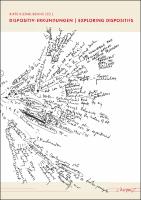Dispositiv-Erkundungen | Exploring Dispositifs
Contributor(s)
Kleine-Benne, Birte (editor)
Collection
Knowledge Unlatched (KU)Language
GermanAbstract
Will man die Linien eines Dispositivs entwirren, so muss man in jedem Fall eine Karte anfertigen, man muss kartographieren, unbekannte Länder ausmessen - eben das, was er [Foucault] als 'Arbeit im Gelände' bezeichnet hat", formulierte Gilles Deleuze 1988. Mit der vorliegenden Publikation soll ein kartographierendes Aus- und Vermessen eines komplexen, verzweigten, unübersichtlichen, zum Teil auch uneinsichtigen und übercodierten Geländes geleistet werden. Als Effekt könn(t)en fortgesetzte Klärungen von Begriffen, Konzepten und Operationsweisen dessen stattfinden, was als Kunst bezeichnet wird. 18 Autor*innen nehmen ihre Dispositiv-Erkundungen vor, so dass eine Anthologie von ausgewählten Stimmen entsteht. Die Autor*innen und ihre Texte erkunden multiperspektivisch, disparat, forensisch und komplexierend, in verschiedenen Sprachen, in ihren Entstehungskontexten und Entstehungszeiten, mit ihren stilistischen Mitteln und in einigen Fällen eng mit ihren früheren Publikationszusammenhängen verbunden. Sie sind damit im besten Fall in der Lage, je eigene Denkräume aufzufalten, die ermöglichen, Einzelbestandteile der beschriebenen oder analysierten Dispositive -- und dabei kann es sich offenbar um Einzeloperationen, Prozesse, Prozeduren, Blicke, Lücken, Aufspaltungen, Implikationen, Vorbedingungen etc. handeln -- zu unterscheiden und in einem nächsten Schritt strategische Formationen dieser heterogenen Ensembles zu diagnostizieren. Darüber hinaus ermöglichen die zusammengestellten Texte, unterschiedliche Varianten, Ausgangs-, Ansatz- und Schwerpunkte wie auch Stile von Dispositiv-Erkundungen nachvollziehen zu können. As Gilles Deleuze has argued in 1988, “[u]ntangling these lines within a social apparatus [dispositif] is, in each case, like drawing up a map, doing cartography, surveying unknown landscapes, and this is what he [Foucault] calls ‘working on the ground.’” This publication intends to provide a cartographic mapping of a complex, multi-branched, often obscure, sometimes inaccessible and overly encoded terrain. Such a mapping could and can lead to a further clarification of terms, concepts and modes of operation of that which is called art. This volume comprises 18 authors whose explorations of the dispositif have generated an anthology of select, distinct voices. Their texts are marked by multiple perspectives, they are disparate, forensic and complex, they are written in different languages, stem from different contexts and points in time, are endowed with different styles and, in some cases, also stand in close relationship with other, earlier publication contexts. This means that they are ideally positioned to unfold diverse spaces of thought, allowing them to differentiate between individual components of the dispositifs they discuss or dissect -- this may include individual operations, processes, procedures, glances, lacunae, splits, implications, preconditions, et cetera -- and allowing them, in a next step, to diagnose the strategic formations such heterogeneous ensembles might take. Beyond that, the texts assembled here allow us to discern the different variations, starting points, approaches and emphases as well as different styles of dispositif exploration. Beiträge von / Contributions by: Elke Bippus, Luis Camnitzer, Ibou Coulibaly Diop, Thomas Oberender, Andrea Fraser, erwin GeheimRat, Siri Hustvedt, Silvia Jonas, Birte Kleine-Benne, Michael Lingner, Lucy Lippard, Adelheid Mers, Brian O’Doherty, Julia Pelta Feldman, Adrian Piper, Stefan Römer, Thorsten Schneider, Ruth Sonderegger


 Download
Download